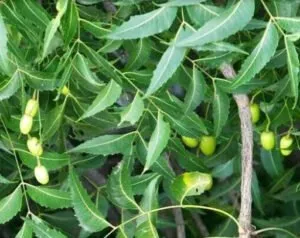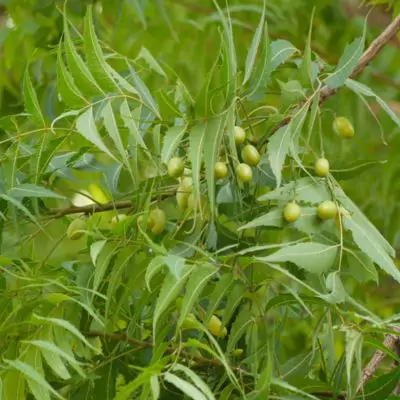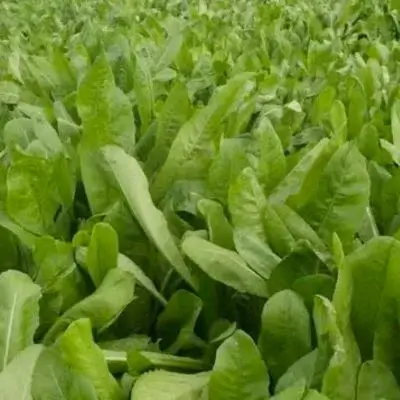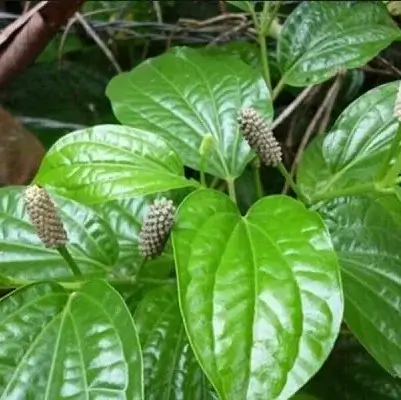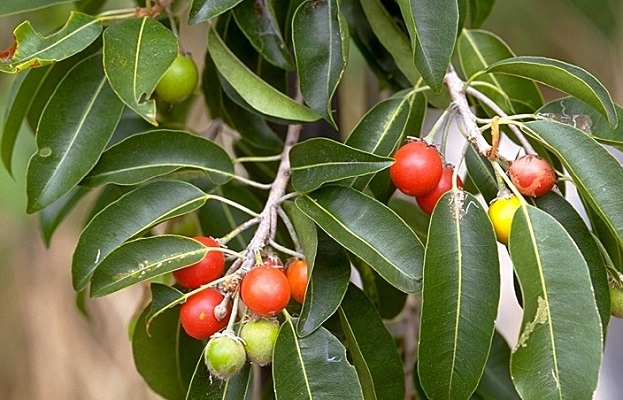On This Page
Nimba – Azadirachta indica
Introduction
Nimba, commonly known as Neem tree is one of the most widely used herb in Ayurveda. The name Nimba means that the plant is very useful and maintains health. The name Azadirachta indicates that it is considered as one of the best plants. Indica means it is native of India. As the name indicates, Neem have many uses in treatment purposes.
Dr.Gupta’s IAFA has been consistently working on Neem to find out more medicinal properties of the plant. Our experts have successfully proven the activities like Antiallergic, anti-inflammatory, antimicrobial, digestant, and insecticidal properties of Neem. Neem can be used to treat diseases like Skin disorders, Worm infestations, Cough, Itching, Fever etc. The ethanolic extracts of the plant can act as anti-inflammatory agent and have protective effects on neuronal populations in the inflamed central nervous system. The irrigantsformulated from different parts of the tree have antimicrobial effects. The aqueous extract of the leaves and barks are capable of providing antidiabetic effects.
Action of Nimba – Azadirachta indica in Allergies
IAFA experts have successfully proven the antiallergic ,antimicrobial and anti-inflammatory properties of the plant Neem. The plant contains phytoconstituents like Nimbin, Nimbinene, Nimbandiol, Nimbolide,Quercitin, B-sitosterol, Azadirone, Azadiradione and Azadirachtin and these aids in the antiallergic property of the plant. Neem can be used in Psoriasis and other skin disorders. It is one of the most widely used herb for the treatment of skin allergic conditions.
Vernacular Names
| Sanskrit Name | Nimba |
| Hindi Name | Nim |
| English Name | Neem tree |
| Malayalam Name | Veppu |
| Kannada Name | Bevinamara |
| Marathi Name | Kadunimba |
Botanical Name
Azadirachta indica
Family
Meliaceae
Morphology of Nimba – Azadirachta indica
- Large tree
- Taproot system
- Stem woody and branched
- Leaves compound, lanceolate
- Inflorescence axillary panicle
- Fruit drupaceous
Ayurveda reference of Nimba – Azadirachta indica

Geographical distribution of Nimba – Azadirachta indica
Neem seen in South Indian states like Karnataka, Kerala, Tamilnadu & Andhra Pradesh also in North India.
Phytoconstituents of Nimba – Azadirachta indica
- Leaves contain Nimbin, Nimbinene, Nimbandiol, Nimbolide,Quercitin, B-sitosterol, Azadirone, Azadiradione and Azadirachtin.
- Bark has Nimbin, Nimbinin, Nimbidin, Margolone and Margo lonone.
- Seeds contain Nimbin, Nimbidin, Azadirachtin, Chlorogenic acid, Salanin and 4-Epinimbin.
Parts used of Nimba – Azadirachta indica
- Whole plant
Dosage of Nimba – Azadirachta indica
- Decoction (kwatha) – 60 ml
- Powder (churna)- 5 g
Medicinal Properties of Nimba – Azadirachta indica
- Kushtaghna-alleviate skin disorders
- Krimighna – useful in worm infestations
- Kandughna-relieves itching
- Jwaraghna-relieves Fever
- Vishaghna – useful in poisoning
- Vranahara – useful in wounds
- Kasahara – relieves cough
- Sulahara-relieves pain
- Sophahara – relieves swelling
- Swasahara – relieves asthma.

Have A Health Issue?
Consult Online
- Dr. Sahil Gupta (B.A.M.S., M.H.A.)
Ayurvedic Allergy Specialist
CEO & Founder of IAFA®
Home remedies of Nimba – Azadirachta indica
Ayurveda is an ancient treatment system which uses naturally available herbs and materials for the purpose of alleviating diseases. The herbs used in Ayurvedic treatments are devoidof any side effects. Neem is one of the most commonly available herb and can be used to treat diseases like –
- In Worm infestations (Krimi) – Decoction is prepared by taking 5-6 leaves of Neem and 4 times of water. This is taken internally at a dose of 60 ml per day.
- In Psoriasis (Kushta) – The affected skin part is cleaned with Nimba and Embelia powder mixed with cow’s urine. Then the same mixture is taken internally also.
- In Diabetes (Prameha) – Decoction prepared with Neem and Amalaki can be used to control diabetes. The dose is 60 ml per day.
- In other skin diseases (Twak roga) – Paste prepared from Nimba and Cassia is applied over the skin part which is affected .
- In Fever (Jwara) – Decoction made with leaves of Neem and Tulsi taken internally at a dose of 60 ml.
- In Inflammation (Sopha) – Paste prepared from Nimbabark,Honey and ghee is applied over the skin part.
- In Head boils (Arumshika) – Decoction made by adding Neem leaves are sprinkled on the sites of head boils after doing blood letting .
- In Cough (Kasa) –Decoction of Leaves of Nimba is taken daily at a dose of 60 ml per day
IAFA, guided by Dr.Gupta mainly aims in promotion of Ayurvedic science . We use naturally available herbs to cure diseases especially allergic conditions. IAFA follows guidelines that are purely based on Ayurveda textbooks for treatment purposes. By consistently hard working, we are able to provide you risk free medicines. We recommend all to use our herbs for better immune system.
Reach IAFA for safe herbal remedies for all your ailments!!!
Was this Page Helpful?
Read More Articles

Kasini (Cichorium intybus)
Know about the uses, benefits, and medicinal properties of Chicory, Kasini (Cichorium…

